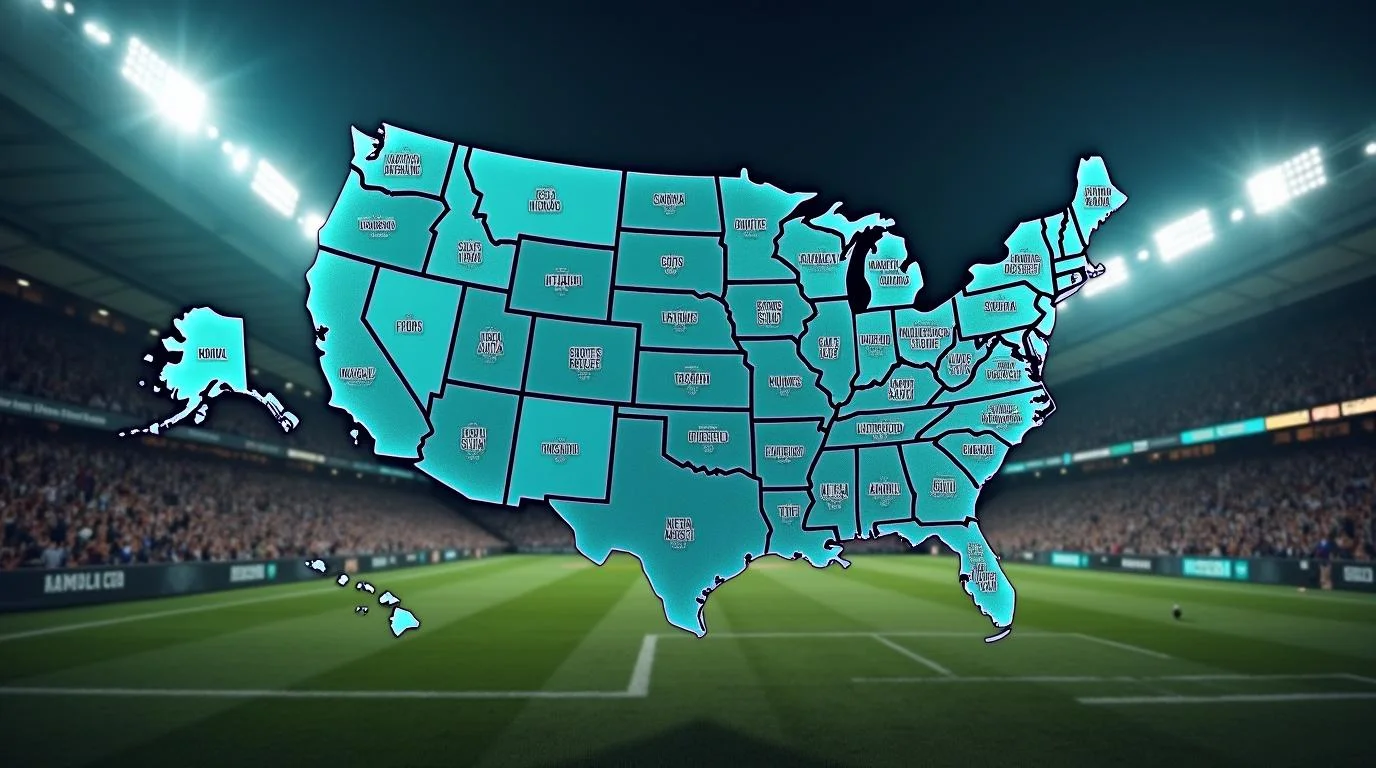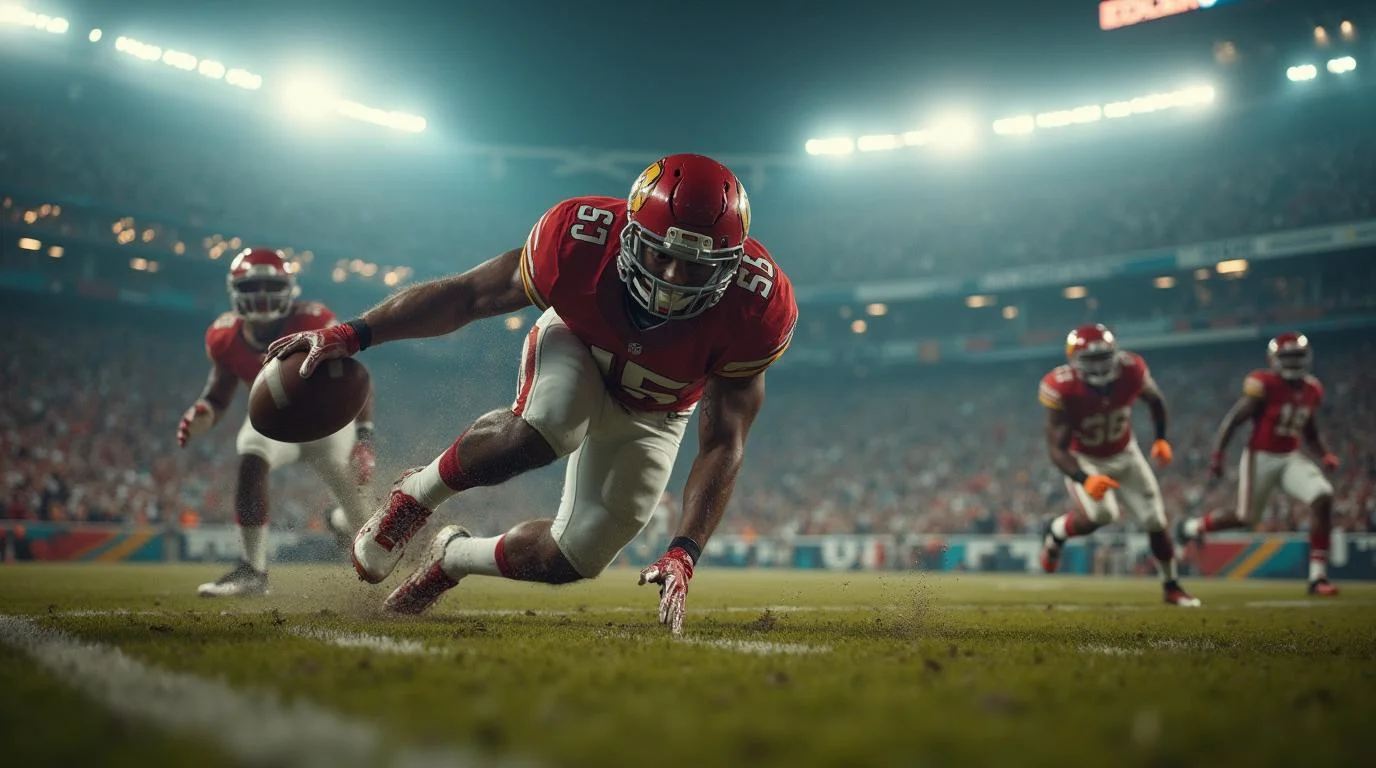U.S. Sports Betting at a Glance
| Is U.S. Sports Betting Legal? | No. of States with Legal Sports Betting | When was Sports Betting Legalized? | Legal Gambling Age in US |
|---|
| Yes (varies by state) | 38 (plus the District of Columbia & Puerto Rico) | 2018 | 18 or 21 (varies by state) |
Is Sports Betting Legal in the U.S.?
Yes, sports betting is legal in the U.S. in general. However, the legality depends on where you are.
In 2018, the United States Supreme Court overturned the Professional and Amateur Sports Protection Act (PASPA), a federal ban against sports betting. PASPA was enacted in 1992 and made betting illegal throughout most of the country. Certain states (such as Nevada) and events (such as horse racing) were granted exemptions.
When the ban was struck down in 2018, individual states were allowed to determine the legal status of sports betting. As a result, sports betting is legal on a state-by-state basis.
Legality depends on location rather than residency. This means, if you are within the borders of a state where sports betting is legal, you can claim sportsbook promos and place a bet even if it is illegal in your home state.
Some states have legalized retail and mobile betting, while others have only approved one or the other.
Latest News on U.S. Sports Betting
- Crypto.com and Underdog partner to offer sports prediction markets in 16 states.
- FanDuel announces it is partnering with CME Group, a CFTC-regulated exchange, to launch new products and expand access to financial markets for FanDuel's customers.
- The Missouri Gaming Commission awards untethered mobile licenses to operate anywhere in Missouri when legal wagering begins to DraftKings and Circa Sports. Meanwhile, FanDuel secures a market access agreement through a partnership with MLS club St. Louis City SC. A tethered license still needs to be approved by the MGC.
- Kalshi and xAI announce they are partnering to bring Grok to prediction markets.
- SI Sportsbook tells customers that it will close operations in the U.S. on July 28.
- The U.S. Department of Justice and the Commodity Futures Trading Commission (CFTC) have reportedly closed their investigations into Polymarket to investigate whether the platform was accepting trades from U.S.-based users.
- Flutter Entertainment will buy Boyd Gaming's 5% stake in FanDuel for about $1.76 billion, giving Flutter complete ownership of FanDuel.
- U.S. Rep. Dina Titus introduces the FAIR BET Act, which would restore the 100% loss deduction from gambling winnings undone by the Tax Cuts and Jobs Act.
- President Donald Trump signs the Tax Cuts and Jobs Act into law. A last-minute addition would limit gambling losses to 90% of gambling winnings, meaning even gamblers who lose would owe taxes, beginning Jan. 1, 2026.
- ESPN announces it will launch a brand-new streaming service in early fall that will include enhanced betting on mobile and connected TV.
- Rep. Paul Tonko (D-N.Y.) and Sen. Richard Blumenthal (D-Conn.) re-introduce the SAFE Bet Act to establish federal standards for operators and address potential public health issues.
- NCAA president Charlie Baker and NFLPA representative Johnson Bademosi urge Congress to rein in sports betting at a Senate hearing, citing online harassment and addiction risks.
The American Gambling Association reported the total 2024 U.S. sports betting handle reached nearly $150 billion. Sports betting operators saw their revenues increase by more than 25% to $13.7 billion in 2024.
A recent TransUnion survey reveals that 26% of U.S. adults engaged in some kind of legalized sports betting in Q4 2024, up from 24% in Q4 2023. The growth was driven primarily by Baby Boomers (+7% versus last year) and Gen Xers (+4% versus last year), offsetting a 5% decline among Millennials.
Additionally, about 13 million U.S. adults (approximately 5% of the adult population) wagered over $500 monthly on sports betting in 2024. The survey showed that most high-volume bettors have above-average incomes and credit scores, suggesting they have the financial means to sustain their betting activity.
Latest Developments with Prediction Markets
Some new players are cautiously entering the sports betting world, including Kalshi, a prediction-market startup allowing users to bet on current events; Robinhood, a financial services company that enables users to buy and sell investments online; Crypto.com, a cryptocurrency exchange service; and Polymarket, an online betting prediction market.
Moves within and outside these companies are starting to signal a shift in how they are being viewed:
- The DOJ and CFTC have ended their investigations into whether Polymarket accepted trades from U.S.-based users, particularly around the 2024 elections.
- The CFTC dismissed its appeal against Kalshi, and the U.S. Court of Appeals for the D.C. Circuit granted this dismissal, allowing Kalshi to continue offering election-related contracts.
- Flutter Entertainment, which owns FanDuel, has started shifting staff to monitor the latest updates on prediction markets in the U.S., and Sporttrade is petitioning the Commodity Futures Trading Commission (CFTC) for permission to offer its sports prediction product nationwide.
- Sara Slane, who once served as SVP/Public Affairs at the American Gaming Association, joined Kalshi as Head of Corporate Development. She liaises with government officials and sports leagues.
Nevertheless, there is still some resistance from individual states.
U.S. Rep. Dina Titus of Nevada sent a letter to the CFTC urging the commission not to allow exchanges to offer sports markets, saying they create a backdoor to legalize sports betting in unauthorized states. Several states, including Illinois, Maryland, Massachusetts, Nevada, New Jersey, and Ohio, have sent cease-and-desist letters to these companies, arguing that they infringe upon their betting regulations. Kalshi has contested these orders, and Nevada and New Jersey courts have granted preliminary injunctions in its favor.
Where Is Sports Betting Legal? State-by-State Overview
Some form of sports betting is currently legal in 38 states and the District of Columbia. Below is a summary of the current legislative status in all 50 states and key jurisdictions, including launch dates, legal betting ages, regulators, and basic college betting rules.
Alabama: Not Legal
Alabama sports betting is illegal in all its forms. The most recent sports betting legalization bill in Alabama was killed in early April 2025.
| Launch Date | Legal Betting Age | Regulatory Body | Online Betting Options | Retail Betting Options | College Betting Rules |
|---|
| N/A | N/A | N/A | None | None | N/A |
Alaska: Not Legal
Alaska sports betting is prohibited. House Bill 145 was filed in 2025 to authorize mobile sports betting, but it never made any headway.
The median household income in Alaska is over $88,000, indicating an incentive for the state to legalize betting to collect tax revenue. However, the state's small population (740,000) may make it difficult.
| Launch Date | Legal Betting Age | Regulatory Body | Online Betting Options | Retail Betting Options | College Betting Rules |
|---|
| N/A | N/A | Alaska Department of Revenue's Tax Division | None | None | N/A |
Arizona: Legal
On April 12, 2021, the state Senate approved Senate Bill HB 2772, which legalized retail Arizona sports betting and online sports betting. Online operators in Arizona took their first wagers five months later in September.
Retail licenses have been issued to professional sports teams and Native American tribes.
The Arizona Department of Gaming issued a cease-and-desist order to Kalshi and submitted comments to the CFTC calling purchase contracts on future sports illegal gambling.
| Launch Date | Legal Betting Age | Regulatory Body | Online Betting Options | Retail Betting Options | College Betting Rules |
|---|
| Sept. 9, 2021 (online) | 21 | Arizona Department of Gaming | Bally Bet, bet365, BetFred, Betcris, BetMGM, BetRivers, Caesars, Desert Diamond, DraftKings, ESPN BET, Fanatics, FanDuel, Hard Rock Bet, Sporttrade | Desert Diamond casinos, Gallager Sports Grills, GIla River Hotels & Casinos, TPC Scottsdale, State Farm Stadium, Footprint Center | Betting on game outcomes, including in-state games, is allowed, but wagering on player props is prohibited. |
Arkansas: Legal
Arkansas sports betting was legalized in 2018. At first, bets could only be placed at one of three land-based casinos: the Saracen Casino Resort, Southland Casino, and the Oaklawn horse racing track and casino. After new rules met legislative approval in 2022, online sports betting became legal and officially launched in April of that year.
The House Judiciary Committee has recommended HB 1861, the bill to legalize iGaming in Arkansas, for interim study. This came as a shock since Senator Bart Hester recently told Gambling.com that the bill had no chance.
| Launch Date | Legal Betting Age | Regulatory Body | Online Betting Options | Retail Betting Options | College Betting Rules |
|---|
| July 2019 (retail); March 2022 (online) | 21 | Arkansas State Racing Commission | Betly, BetSaracen, Oaklawn Sports | Oaklawn Racing Casino Resort, Saracen Casino Resort Annex, Southland Casino Racing | No restrictions |
California: Not Legal
California Attorney General Rob Bonta has declared paid daily fantasy sports illegal under state law. A tribe-backed amendment to Assembly bill AB831 to prohibit sweepstakes games also appears poised to pass.
In the past, the biggest roadblocks to legalization have been a lack of communication between supporters of new initiatives and the state's federally recognized tribes. Despite several efforts to legalize California sports betting since 2018, it remains illegal.
Representatives from DraftKings and FanDuel, Sports Betting Alliance members, at the Indian Gaming Tradeshow & Convention shared their plans for creating a tribal entity to contract with national operators in California. However, California Nations Indian Gaming Association and the Tribal Alliance of Sovereign Indian Nations spoke out, saying that tribal leaders are offended that the Sports Betting Alliance invited a reporter into what was intended to be a private roundtable discussion among tribal leaders regarding this controversial issue.
| Launch Date | Legal Betting Age | Regulatory Body | Online Betting Options | Retail Betting Options | College Betting Rules |
|---|
| N/A | N/A | California Gaming Control Commission | None | None | N/A |
Selected State Snapshots
Colorado: Legal
Mobile and land-based Colorado sports betting became legal during the spring of 2020. Retail sports betting is limited to casinos in Black Hawk, Central City, and Cripple Creek.
Hard Rock Bet is now available in Colorado.
The Colorado Senate passed House Bill 1311, which would no longer allow sports betting operators to deduct promotional bets from their taxes. The write-off would fully sunset by July 1, 2026. The Legislative Council Staff estimates this would add $11 million annually in tax revenue.
Florida: Legal
Retail and online Florida sports betting are legal. Hard Rock Bet is the only online sports betting operator available in Florida thanks to the operator's compact with the state.
In June 2024, the U.S. Supreme Court declined to hear a case that would have challenged the Seminole Tribe's 30-year compact with Florida, which gives the tribe exclusive oversight of online sports betting. By October, the Seminole Tribe of Florida and West Flagler Associates, who were challenging the compact, ended their legal dispute and formed a new partnership. As part of the ensuing agreement, the tribe began promoting jai alai on the Hard Rock Bet app.
In-person betting is available at certain casinos run by the Seminole Tribe. The Florida Seminole Tribe owns and operates the Hard Rock brand, including its sportsbook.
Illinois: Legal
Illinois sports betting went live in March of 2020. Retail wagering is available at facilities throughout the state, and there are currently multiple options for betting.
Lawmakers approved a state budget that included a surcharge of $0.25 or $0.50 per wager for Illinois operators. In response, FanDuel and DraftKings will add a $0.50 per-bet fee in Illinois. BetMGM is increasing the minimum bet for all wagers to $2.50, and Hard Rock Bet is instituting a minimum $2 bet.
This comes on the heels of a sports betting tax hike levied in 2024.
Illinois has also joined several states in sending cease-and-desist letters to Kalshi, Robinhood, and Crypto, three trading platforms that offer event-based contracts on sports. The state argues that these platforms encroach on sports betting regulations and laws.
New York: Legal
Legal sports betting in New York went live in 2019 when retail betting sites launched at upstate casinos. Online betting began in January 2022 and has since grown to nine operators.
Resorts World Bet left New York State at the end of June, and Las Vegas Sands recently withdrew its bid to open a $4 billion casino complex on Long Island.
Ohio: Legal
Ohio sportsbooks are legal both in-person and online. There are nearly 20 online betting operators, and there are many retail locations throughout Ohio as well. Sports wagers can be placed at select grocery stores in Cincinnati and Dayton. The state is down one of its retail locations as the Cleveland Guardians have closed the Fanatics Sportsbook at Progressive Field.
Regulators are reviewing the types of microbets currently offered by the state's books on all sports, before drafting a rule to remove some player-specific props from the list of approved wagers. This consideration came after suspicious betting activity tied to first pitches by two Cleveland Guardians pitchers, which is now under investigation. Governor Mike DeWine called on the Ohio Casino Control Commission to ban all prop bets.
Ohio has joined several states in sending cease-and-desist letters to Kalshi, Robinhood, and Crypto, three trading platforms that offer event-based sports contracts. The state argues that these platforms encroach on sports betting regulations and laws.
Other Jurisdictions: Washington D.C. and Puerto Rico
Washington D.C.: Legal
DC sports betting underwent a major change in 2024. In April, FanDuel replaced GameBetDC, the city-controlled online sports betting platform, as the official partner of the DC Lottery. In the first 30 days, FanDuel brought $1.9 million to the city.
The District's 2025 fiscal year budget included provisions for launching up to seven online sports betting operators. Before the council officially approved the new budget, FanDuel president Christian Genetski said FanDuel would terminate its relationship with the DC Lottery and continue as an independent operator.
BetMGM and Caesars Sportsbook expanded their online presence in Washington, D.C., in July, allowing bettors to place wagers anywhere in the district. Previously, online bets were restricted to the two-block radii surrounding Nationals Park and Capital One Arena.
Hotels, bars, and restaurants can apply for retail sports betting licenses. The Office of Lottery and Gaming regulates sports betting in the District of Columbia.
ESPN BET became an official partner of the Washington Capitals, Washington Wizards, and Washington Mystics, all based in D.C.
Puerto Rico: Legal
A 2019 bill legalized sports betting in Puerto Rico. BetMGM and Caesars are the two apps available to make wagers on the island.
However, to use the apps, you must first register in person at the operator's land-based locations: Casino del Mar for BetMGM and Casino Metro for Caesars.
History of Legal Sports Betting in the United States
Pre-1800s: Colonists bet primarily on horse races without many restrictions.
Early 1800s: Concerned about corruption, some states begin to crack down on gambling, including sports betting. However, betting at the track continues to be allowed. Horse racing soon becomes the preeminent sport in the U.S.
1890s: Lotteries are outlawed in every state except Delaware and Louisiana.
1911: Nearly all forms of gambling have been banned.
1919: Baseball’s Black Sox Scandal, in which a group of players plot to lose World Series games, damages the image of sports betting.
1931: In response to the financial devastation of the Great Depression, Nevada legalizes casino gambling and sets the stage for the state to allow sports betting.
1949: Nevada becomes the first state to legalize sports betting beyond horse racing.
1976: New Jersey becomes the second state to legalize gambling after Nevada.
1992: The Professional and Amateur Sports Protection Act (PASPA) is passed by the United States Congress, effectively banning sports betting in most states.
2012: The state of New Jersey challenges PASPA in court, contending that it violates state sovereignty.
2018: The Supreme Court overturns PASPA, allowing states to determine the legal status of sports betting.
2018 to present: Dozens of states legalize and regulate sports betting in various forms, including retail and online. To date, 38 states and the District of Columbia have legalized sports betting.




























